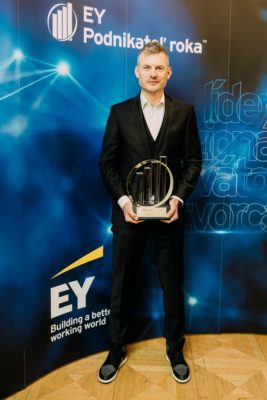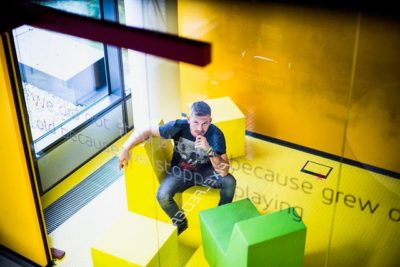Growing up in communist Czechoslovakia, Simon Sicko had no such guiding light. In fact, he says, “Life in socialism was gray.”
It’s quite an achievement, then, to build a company that has invented some of the most popular mobile and computer games in the world. As CEO and Co-Founder of Pixel Federation, Sicko’s games are played by 80 million people worldwide. Sicko now inspires a new generation of entrepreneurs in an entire region of post-Eastern Bloc countries and has been named EY Entrepreneur Of The Year™ for the Slovak Republic. EY’s World Entrepreneur Awards Program is considered the most prestigious business award for entrepreneurs across the globe. EY celebrates executives who are building and leading successful businesses and inspiring others with their vision and leadership. Sicko was honored at the EY global awards celebration in Monte Carlo, Monaco in June. Three other YPO members from Sweden, South Africa and the United States were honored as well. From a young age, Sicko was fascinated with Western culture. “Going back to my childhood, I was always looking for opportunities, dreaming of American things,” he says. “I was really lucky because my grandmother got a magazine called One Hundred Plus One in Czechoslovakia that included interesting articles from abroad that were politically correct. She had a huge stack of these, and I was always digging for interesting info about the world from behind the wall.” Living in close proximity to Western Europe gave Sicko an advantage and primed him for what came next. “I lived in Bratislava, a city on the border of Austria, so we were able to watch Austrian TV programs. All the time, I was thinking, ‘It’s really bad here. We don’t have opportunities.’ When the revolution happened in 1989, I was ready,” he affirms. “For me, freedom is a great value. I appreciate all the opportunities we didn’t have before.” Sicko studied architecture at university and began working as an architect immediately after graduation. A few years later, one of the first Slovak gaming companies, 10tacle Studios, had an intriguing proposition: would Sicko like to design virtual cities instead of real buildings? He jumped at the chance. “I had been in love with games since 1982,” he reveals. “I was always looking at games as a kind of art that you could interact with.” He met his future wife, Lucia Sickova, along with Marian Fridrich and Filip Fischer while at 10tacle. The four of them co-founded Pixel Federation in 2007. “We were the garage startup story of Slovakia. But instead of a garage, we had an old, leaky factory building — just 34 square meters (366 square feet) of space and no money for furniture. The building was so bad, that when it rained, we had to move the computers because water was coming through the roof.” Over the next few years, the company made five unsuccessful games before it had a hit. “It was a rough time,” Sicko concedes. “I learned important things about entrepreneurship. First, you need to have a really strong vision. Our vision was that we wanted to be independent game developers so badly, we were determined to survive.” He continues, “Second, you need to learn from failures and be resilient. We analyzed why our games weren’t successful, found a pattern, and learned how to change things. One of the things we learned is that we should become our own game publisher. The Facebook platform gave us an opportunity to do that.” Today, Diggy’s Adventure is played by 2.5 million people per month. Pixel has launched several more successful games and has two new ones slated for launch this year. Approximately 100 million players across the globe have played Pixel Federation games. “We’ve thought a lot about our CSR (corporate social responsibility) agenda,” says Sicko. “We decided to support everything related to education.” Pixel does this in two ways: “One of our corporate values is to pursue mastery of your craft,” Sicko asserts. “We invite top experts from around the world to teach and mentor in our company. We also send our employees around the world to learn new things.” Pixel has supported numerous innovative education programs in the Slovak Republic. That includes Edulienka, an unconventional educational concept for home-schoolers, and Hemisfera, an educational startup to help kids learn about art, coding and game design. Pixel has contributed to the creation of an arts support fund for game projects and has supported two experimental high schools called “Concept Art” in Kosice and Trencin. Additionally, Pixel has partnered with three other companies and a school to launch a program called Butterfly Effect. “It’s about practical digital education,” Sicko explains. “Students create a digital product from concept to launch, while being mentored by experts. We already have 60 alumni and all of them found work in IT or gaming companies. We employed six of them!” The partners of Butterfly Effect hope to integrate this concept into the standard curriculum of several universities. The city of Bratislava, where Pixel Federation is located, aims to combine forces with nearby cities such as Vienna, Prague and Budapest to become central Europe’s answer to Silicon Valley. This economic region is called The Danube Valley. Sicko is passionate about nurturing talent and expanding the ecosystem of entrepreneurs here. “You can’t copy/paste Silicon Valley. Businesses there have proximity and a willingness to share knowledge,” Sicko says. “Europe is a different kind of culture, where you never speak about what you are doing. I believe this is the wrong strategy, so I get together with other entrepreneurs and we call it a brain trust. It’s a meetup to share everything, and we see acceleration of certain businesses because of that. In that way, we can help Europe and help the world as well.”
A glimpse of Western culture from behind the wall
From architecture to “garage startup”

Supporting education helps Pixel and the community

Entrepreneurial “brain trust” expands opportunities in the Danube Valley

